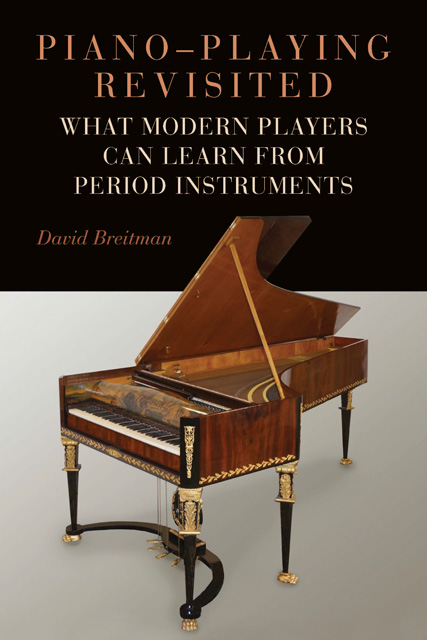Book contents
- Frontmatter
- Dedication
- Contents
- List of Illustrations
- Preface
- Acknowledgments
- 1 Music Making Then and Now
- 2 With Broad Strokes (An Overview)
- 3 The Early Days of the Piano: Haydn and Mozart
- 4 Beethoven and the Evolving Piano
- 5 Schubert
- 6 Chopin
- 7 The Clavichord
- Epilogue: Creativity in the Performance of Old Music
- Appendix: Overtone Structure of the Steinway and Walter, Compared
- Glossary of Terms
- Notes
- Bibliography
- Index of Works
- General Index
Epilogue: Creativity in the Performance of Old Music
Published online by Cambridge University Press: 17 January 2023
- Frontmatter
- Dedication
- Contents
- List of Illustrations
- Preface
- Acknowledgments
- 1 Music Making Then and Now
- 2 With Broad Strokes (An Overview)
- 3 The Early Days of the Piano: Haydn and Mozart
- 4 Beethoven and the Evolving Piano
- 5 Schubert
- 6 Chopin
- 7 The Clavichord
- Epilogue: Creativity in the Performance of Old Music
- Appendix: Overtone Structure of the Steinway and Walter, Compared
- Glossary of Terms
- Notes
- Bibliography
- Index of Works
- General Index
Summary
Period instruments and contemporary written accounts can illuminate the nuts and bolts of piano playing: dynamics, note lengths, articulation, voicing, pedaling. But what about creativity? By learning how the music was played in the past, do we give up the freedom to create in the present? One of the seminar students struggled poignantly to express this dilemma:
What is tasteful or appropriate for a style of music always seems to be in direct conflict with the personality or ego of the performer … Is it our responsibility to accurately interpret the music as intended by the composer at the moment of conception or should we be trying to breathe new life into this music? We have witnessed in the last century a trend toward self-indulgent interpretations of music without careful adherence to the stylistic intricacies that make one composer’s works distinguishable from another’s. These details are often sacrificed, as a result of a lack of knowledge or neglect, for what sounds pleasing on the modern instrument… . Are we then just a vessel for the composer’s ideas or do we play an even greater role in the creation of this music? To what extent can the performer take personal liberties with the music and still stay true to the spirit of a work?
“Accurately interpret” vs. “take personal liberties.” Be a “vessel” or be “self-indulgent.” Are these the only alternatives? The dilemma is quite recent, since the objective conception of performance (performer as “vessel”) arose only after the First World War. Its proponents believed that the player should offer “just the facts, ma’am;” anything more only reflects the arrogance of the performer’s ego. Stravinsky makes the point forcefully:
The sin against the spirit of the work always begins with a sin against its letter and leads to the endless follies which an ever-flourishing literature in the worst taste does its best to sanction. Thus it follows that a crescendo, as we all know, is always accompanied by a speeding up of movement, while a slowing down never fails to accompany a diminuendo. The superfluous is refined upon; a piano, piano pianissimo is delicately sought after; great pride is taken in perfecting useless nuances—a concern that usually goes hand in hand with inaccurate rhythm …
- Type
- Chapter
- Information
- Piano-Playing RevisitedWhat Modern Players Can Learn from Period Instruments, pp. 169 - 174Publisher: Boydell & BrewerPrint publication year: 2021



